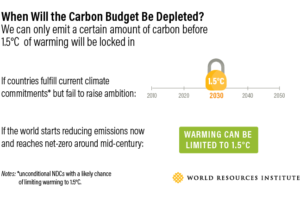Gaia Energy IFC Publications
The latest report of the UN, published this last week by the IPCC ( Intergovernmental Panel on Climate Change) , was a global alarm and big wake up call for all governments, organisations and civil society around the world.
It is a known fact that global populations are rising exponentially making their consumption grow as well, supposing an ever growing energy demand as well as enormous rates of CO2 emissions. Most of these emissions are due to the fact that most of the governments still rely on fossil fuels for the powering of industries, households’ consumption, transportations etc… These emissions amount to 1010 Gigatons from the year 1855 to 1999, years of the industrial revolution era. In the relatively small time period from 2000 to 2015, we have released another 500 Gigatons.
Our ‘’carbon budget’’ indicates how much we can still release before a catastrophe ; today, the budget is 335 additional Gt of CO2. We produce annually around 36 Gt of carbon emissions, that is to say, we have 8 years until we use our carbon budget in a disastrous way, if emissions continue to rise by 2,5% every year , as It is the case at the moment.
In fact, the report stated that we are only half a degree C° away from the catastrophic global warming red line of 2°C, after which we will need to perform carbon removal from the atmosphere. Scientists have spent considerable time calculating the amount of carbon dioxide the world can emit while limiting warming to internationally agreed upon temperature goals – well below 2°C (3.6°F), with efforts to limit warming further to 1.5°C (2.7°F). This amount is our “carbon budget.”
The World Resources Institute also analyzed some of these aspects and added that in order to have a medium chance of limiting warming to 1.5°C, the world can emit 770 gigatonnes of carbon dioxide (GtCO2). To have a likely chance (67 percent), the remaining budget drops to 570 GtCO2.
To have a likely chance of keeping warming to 1.5°C over the longer term, the world will need to reach net-zero emissions within 25 years.
In the context of such an imminent climate emergency, Gaia Energy Holding has answered effectively to the UN’s report by elaborating a new strategy on the acceleration of its projects that count already a total of 4 Gigawatts on 22 Renewable Energy projects spread in 10 African Countries, in order to respond to the call for action at a global scale and expand the capacity of its pipeline.
As a response to the IPCC report, Gaia Energy Holdings president, Moundir Zniber, said :
‘’Gaia Energy Holding is ready to accelerate the speed of development of its RE projects in Africa that counting a total over 4 GigaWatts pipeline, and enlarging it into more countries if necessary”.
Gaia’s CEO , Mr Alain Kerboriou, former VP of Vestas, added: “First, we shall do our best to establish political alignment with local decision makers in the countries , including presidency, ministry of energy and ministry of finance, as well as local utility providers . This measure intends to develop infrastructure and policy in the countries where we develop projects , as well as the acquisition of the adequate lands for their realization.
Second, we shall secure the allocation of appropriate funds and accompanying policy structure (EPC-IPP), bonds , to insure the realization of these projects. It will certainly be possible to accelerate the evolution of these projects and extension to 8 Gigawatts, if policy makers and finance agents also respond accordingly to the climate emergency, and help the acceleration of these projects’’
Gaia Energy Holding ‘s urge of immediate rapid action to resolve the climate situation was in alignment with science facts as well as the opinion of the majority of brilliant scientists or our era. Hans-Otto Portner, Co-Chair of IPCC Working Group confirms it by expressing : “Every extra bit of warming matters, especially since warming of 1.5ºC or higher increases the risk associated with long-lasting or irreversible changes, such as the loss of some ecosystems. Limiting global warming would also give people and ecosystems more room to adapt and remain below relevant risk thresholds ”
Another Co-Chair of the IPCC working group, Valerie Masson-Delmotte, is definitely on the side of Gaia Energy proposed solution , by stating: “The good news is that some of the kinds of actions that would be needed to limit global warming to 1.5ºC are already underway around the world, but they would need to accelerate,”
To resume, we add that 1.5 °C is the goal , and maximum point that we should keep our global warming at, to avoid irreversible catastrophe. Going beyond this number will require carbon removal, a process that is way too complex, expensive and unsafe yet. On this ultimate worst case scenario solution, the report also mentions that there are a number of different ways to remove carbon, such as bioenergy with carbon capture and storage (BECCS), afforestation and direct air capture and storage (DACS).
Deploying carbon at the scale that climate models assume is untested. Given the risks and uncertainties related to various carbon removal approaches, scaling would have to be pursued in a safe and prudent manner. If the speed and scale of deployment is limited, this would leave a lot of questions on how much we can rely on this strategy to meet the 1.5 degree goal, especially for those pathways that overshoot 1.5˚C.
Consequences of going over 1.5°C could be the biggest environmental disaster never seen in human civilization; we shall see the levels of oceans rising rapidly , making islands disappear, extreme rainstorms and floods, forest fires and droughts due to massive heat waves…etc
Limiting global warming to 1.5ºC would require rapid, far reaching and unprecedented changes in all aspects of society, the IPCC , UN member, said in the assessment. With clear benefits to people and natural ecosystems, limiting global warming to 1.5ºC compared to 2ºC could go hand in hand with ensuring a more sustainable and equitable society, the Intergovernmental Panel on Climate Change (IPCC) said on Monday.
“With more than 6,000 scientific references cited and the dedicated contribution of thousands of expert and government reviewers worldwide, this important report testifies to the breadth and policy relevance of the IPCC,” said Hoesung Lee, Chair of the IPCC. Ninety-one authors and review editors from 40 countries prepared the IPCC report in response to an invitation from the United Nations Framework Convention on Climate Change (UNFCCC) when it adopted the Paris Agreement in 2015.
The shocking report has left the global community stroke and many politicians, scientists, members of civil society, public speakers as well as institutions reacted to its content, here are some reactions :
UN Secretary-General Antonio Guterres
“This report by the world’s leading climate scientists is an ear-splitting wake-up call to the world. It confirms that climate change is running faster than we are, and we are running out of time. […] I urge all countries to make the Katowice Climate Conference a success and heed the counsel of the world’s top scientists: raise ambition, rapidly strengthen their national climate action plans, and urgently accelerate implementation of the Paris Agreement,” said the UN chief. […] We must rise to the challenge of climate action and do what science demands before it is too late.”
Adnan Z. Amin, director-general of the International Renewable Energy Agency (IRENA)
“IRENA’s analysis shows that renewable energy and energy efficiency represent the most cost-effective pathway for achieving 90% of the energy-related CO2 emission reductions needed to meet the ‘well below 2 degrees objective’ of the Paris Agreement. The world of energy is witnessing rapid and disruptive changes. Renewables already account for around a quarter of global electricity generation. In the last six years, renewable power capacity additions outpaced additions from fossil fuels and nuclear power combined. However, if we are to meet our climate goals, renewables deployment must accelerate six times faster than today.”
Commissioner Miguel Arias Cañete for Climate Action and Energy and Commissioner Carlos Moedas for Research, Science and Innovation
“In short, as there is no planet B, saving our planet Earth should be our number one mission. To this end, research and Innovation will play a crucial role in our efforts to tackle climate change and the EU will continue to lead in that domain. We have put climate at the heart of our proposal for Horizon Europe, the new EU’s research and innovation programme. We propose to invest 35% of the programme to climate objectives, through the development of innovative and cost-effective zero-carbon solutions. We must raise our ambitions in combating climate change in line with the outcome of this report and turn today’s challenges into opportunities.”
Svenja Schulze, German Federal Environment Minister
“Every tonne of CO 2 avoided, every tenth of a degree of global warming avoided counts, and this transformation brings with it many changes and a great opportunity to make our economy more sustainable and make our society more liveable.”
Lars Christian Lilleholt, Danish Energy Minister
“We need everyone to take a common responsibility that we have reduced the now very visible consequences of climate change have around the globe. We are pushing the EU and our international cooperation, and we are going to press on at COP 24 in Poland in December, so the entire UN take joint responsibility.”
François de Rugy, French energy minister,
“In France, the government has set an ambitious target to achieve carbon neutrality by 2050. But we need more than ever to continue our efforts. At the end of the month, we will present our new low carbon strategy. Deployment of clean mobility, phasing out of fossil fuels, [decrease] our energy consumption and our waste production. We must not weaken now.”
Australia’s Prime Minister Scott Morrison, in an interview with 2GB Radio
“No we’re not held to any of them at all Alan, nor are we bound to go and tip money into that big climate fund, we’re not going to do that either. So, I’m not going to spend money on global climate conferences and all that sort of nonsense, I’m not going to get in there – […] So long as we’re not throwing money into some global climate fund and getting pulled around by the nose by all these international agencies when it comes to these other reports. I mean the same report that’s coming out today, said a year ago the policies were fine. You know, we’re investing in the Reef to ensure that’s secure. We’re taking the practical action that you need to take, but we don’t get led around by the nose by these organisations.”
Australia’s Environment Minister Melissa Price, in an Interview with ABC
“[…] Coal does form a very important part of the Australian energy mix, and we make no apology for the fact that our focus at the moment is on getting electricity prices down. I just don’t know how you could say by 2050 that you not going to have technology that’s going to enable good, clean technology when it comes to coal. […] I mean, I just think that’s… You know, that would be irresponsible of us to be able to commit to that.”
AL Gore, former US Vice President and presidential candidate
“The Paris Agreement was monumental, but we must now go further, ratchet up commitments and develop solutions that meet the scale of the climate crisis. The report will encourage the development of new technologies, which is important. However, time is running out, so we must capitalise and build upon the solutions available today. Solving the climate crisis requires vision and leadership. Unfortunately, the Trump administration has become a rogue outlier in its shortsighted attempt to prop up the dirty fossil fuel industries of the past. The administration is in direct conflict with American businesses, states, cities, and citizens leading the transformation.
Hillary Clinton, former US Secretary of State and presidential candidate
“We have barely 10 years to ward off catastrophic warming with destabilizing effects for all of us. Our children and grandchildren deserve action, and action now.”
The UNFCC
The IPCC’s special report clearly states that the world has already warmed by 1ºC due to human activity. As a result, climate change is already affecting people, ecosystems and livelihoods across the globe, with impacts such as floods or droughts disproportionately affecting the poorest and most vulnerable. Some of the most affected areas are small islands, megacities, coastal regions and high mountain ranges. […] According to the IPCC’s report, limiting warming to 1.5ºC is possible, but requires unprecedented transitions in all aspects of society. To minimize future global warming, we will need to achieve zero net emissions by mid-century. This in turn will require us to rapidly transition the world’s economy onto such a pathway. Over the next 10 to 20 years we must transform our energy, agricultural, urban and industrial systems, engage non-state actors, and integrate climate action into the broader public policy framework that also addresses jobs, security and technology.
Kristina Thoring, Communications Director at SolarPower Europe
“The Paris Agreement obliges us to decarbonise our societies, we cannot afford a business as usual approach. The solutions are obvious, replacing fossil fuels with solar is one of the fastest and most cost-effective ways to cut greenhouse gases. Solar power reduces global CO2 emissions by 200-300 million tonnes annually, equivalent to the total greenhouse gas emissions of France. We need to accelerate the deployment of solar power to keep global warming below 1.5 degrees Celsius.”
Dr. Andrew Steer, President & CEO, World Resources Institute
“Limiting warming to 1.5 degrees will require a radical transformation of economic and social systems at a scale never seen before. This is difficult, but by no means impossible. We know how to do it, and we know that it will lead to a much healthier economy and much healthier citizens. We now know that accelerated climate action can lead to large economic benefits, including a $26 trillion win. But this will require the emergence of global leadership that is missing today. Identifying and supporting this leadership must be a top priority.”
UK Solar Trade Association chief executive, Chris Hewett
“The IPCC report today amplifies already very widespread calls for the UK Government to get behind low-cost solar and wind. The message couldn’t be clearer; time is running out. Our industry stands ready to roll out solutions which are extremely popular with the public, and no longer require subsidy, but Government has put too many barriers in the way. Let’s be clear, a smart, flexible, renewables pathway is now the cheapest pathway. All we need to deliver that is fair tax treatment, fair market access and level playing fields. We’ve been repeating this message for years – action is now needed.”
Executive director of Greenpeace International, Jennifer Morgan
“The world is on fire. In order to avoid more of these tragic fires, severe storms and loss of life, the world must halve global emissions in the next decade. This is a huge challenge, but it is doable and the costs of not following the right path are a matter of life and death to millions around the world, particularly the vulnerable.This IPCC report is the most unique and important climate science report we’ve had. Governmental and corporate leaders have nowhere to hide and must show they understand the science by acting with the urgency it demands. But we all have a role. Every person has to do everything in their power to change course and follow the plan that is included in the IPCC report.”
Karin Nansen, chair, Friends of the Earth International
“This is a climate emergency. The IPCC 1.5 report starkly illustrates the difference between temperature rises of 1.5 degrees and 2 degrees – for many around the world this is a matter of life and death. It is crucial to keep temperature rise well below 1.5 degrees without offsetting, carbon markets and geoengineering, but the evidence presented by the IPCC shows that there is a narrow and shrinking window in which to do so. Activists across the world are mobilizing to call for an end to fossil fuels, dirty energy and dangerous technologies. Common but differentiated responsibilities and payment of the climate debt must be at the foundation of climate action. We want a just transition to a clean energy system that benefits people not corporations.”
Global Warming of 1.5ºC is the first in a series of Special Reports to be produced in the IPCC’s Sixth Assessment Cycle. Next year the IPCC will release the Special Report on the Ocean and Cryosphere in a Changing Climate, and Climate Change and Land, which looks at how climate change affects land use. The Summary for Policymakers (SPM) presents the key findings of the Special Report, based on the assessment of the available scientific, technical and socio-economic literature relevant to global warming of 1.5°C.
The Summary for Policymakers of the Special Report on Global Warming of 1.5ºC (SR15) is available at http://www.ipcc.ch/report/sr15/
Authored by
Lea Imane Moussaid
Political Analyst
Head of communication and diplomatic relations
Gaia Energy Holding-IFC World Bank Group


